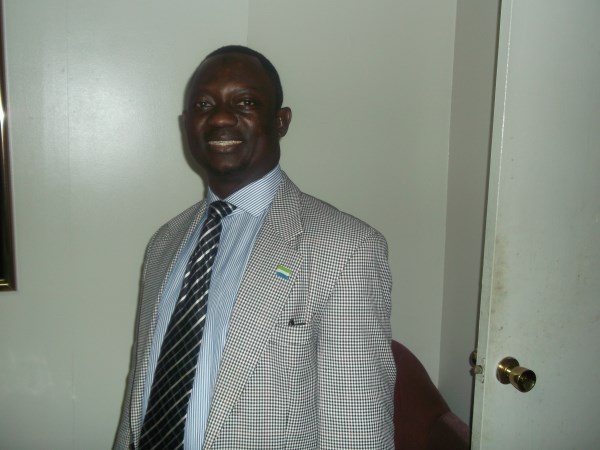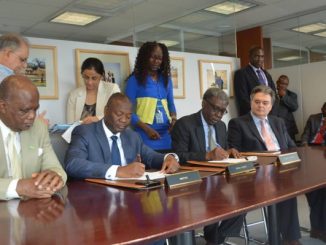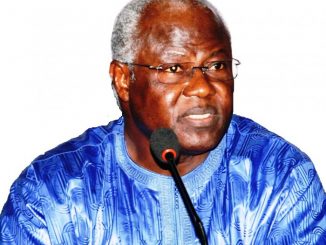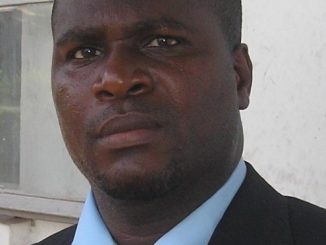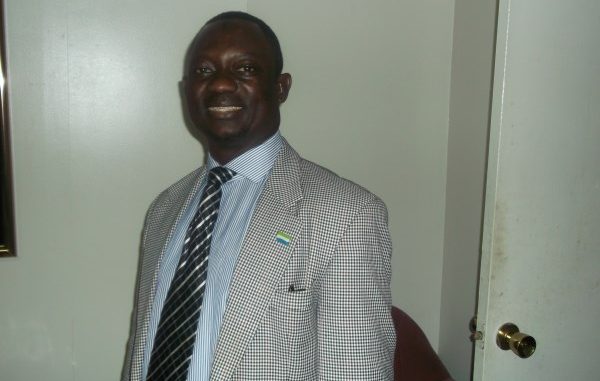
Commentary
By Deputy Ambassador Amadu Koroma, Sierra Leone Permanent Mission to the UN, New York, USA.
Background
In the past couple of weeks, a certain group of Sierra Leoneans particularly those living in the diaspora, have been accusing the President of the Republic of Sierra Leone, Dr. Ernest Bai Koroma, his Ministers and officials of the ruling APC Party who they claim have embezzled most of the funds that were contributed by the international community that were meant to be used in the fight to eradicate the Ebola Virus Disease in the country.
Readers must know that most of the international funds that were collected by the UN Secretary General and his able team to fight EVD in the country go through the UN System. From the various allegations going around in the social media, it is obvious that some Sierra Leoneans have very little knowledge about how the international funds were raised and disbursed in the three most affected countries.
I find myself in a position where I am able to know how the international Ebola funds in the UN System were raised, managed and disbursed and I feel that I have a responsibility to educate our people so that groups with hidden political agendas will not continue to misinform and hoodwink them. The people have the right to know because knowledge is power.
UN Secretary General’s strategic objectives
The UN System Response to the Ebola outbreak in the three most affected countries, Liberia, Guinea and Sierra Leone in the West African sub- region is anchored on five main strategic objectives: (1) Stop the outbreak, (2) treat the infected, (3) ensure essential services, (4) preserve stability, and (5) prevent outbreaks in countries currently unaffected.
Creation of UNMEER
After the unanimous adoption of General Assembly resolution 69/1 and Security Council resolution 2177 (2014) respectively, the UN Mission for Ebola Emergency Response (UNMEER) was established on the 19th of September, 2014 as a temporary measure to tackle the unprecedented spread of the Ebola Virus Disease in the West African sub-region which has killed thousands of people. UNMEER is the first ever UN emergency health mission and it is headed by a Special Representative of the Secretary General with headquarters in Ghana. UNMEER is the recognized UN lead for the Ebola crisis response.
The Multi Partner Trust Fund
It was created to support the UN Response and to provide the necessary funding for the attainment of the above strategic objectives and it is headed by a Special Envoy appointed by the Secretary General. MPTF was launched by the UN Secretary General in September, 2014. Among other objectives, “the Fund was created to provide a coherent UN System contribution to the overall global outbreak response through a common financial mechanism.”
There is a Steering Committee which provides expert advice on the use of the Fund to the UN Secretary General. There is also an Advisory Committee which provides guidance to the Special Envoy of the Secretary General (Dr. David Nabarro) in the management of the Fund. This Committee is composed of the UN Special Envoy as Chair, three representatives of the three most affected countries, three representatives of the contributing donor countries, a representative of UNMEER, and three UN Ebola crisis managers (one from each of the most affected countries).
In the meetings of the Advisory Committee, the UN Special Envoy provides briefings on funding priorities and after consultation with members makes fund allocation decisions. Since its establishment, the Advisory Committee has had six meetings and I have had the privilege of attending three of those meetings when my boss, Ambassador Vandi Chidi Minah, was out of station. The Fund Secretariat provides administrative support to the Advisory Committee and support to the Fund mobilization effort led by the Special Envoy. There is also the UNDP Multi Partner Trust Fund Office which acts as the Trust Fund Administrator of the Ebola Response MPTF.
Who are the contributors to the Fund?
Apart from the traditional contributors to the UN Fund, the MPTF has received contributions from other governments and the private sector since the outbreak of the Ebola virus disease in the West African sub-region. An updated list of all contributors and amounts contributed is shown hereunder in alphabetical order:
Algeria $ 1,000,000
Australia $8,755,000
Bahrain (Royal Charity) $999,975
Bolivia $1,000,000
Brazil $602,845
Canada $3,568,879
Chile $300,000
Colombia $100,000
China $6,000,000
Cyprus $6,350
Denmark $5,042,695
Estonia $50, 216
Finland $8, 824,590
Georgia $25,000
Germany $11,606,933
Guyana $50, 363
India $10,000,000
Ireland $1,233,100
Israel $8,750,000
Japan $5,940,000
Kazakhstan $50,000
Republic of Korea $5,000,000
Latvia $48,876
Luxembourg $248,940
Malta $62,295
Malaysia $100,000
Montenegro $5,000
New Zealand $1,169,400
Norway $2,061,147
Portugal $30,293
Philippines $2,000,000
Private Sector $3,350
Romania $40,000
Russian Federation $1,000,000
Sweden $13, 217,001
Switzerland $4,927,079
United Kingdom $31,884,000
UN Foundation $130,000
Venezuela $5,000,000
Volvo $1,307,360
Total Pledges $142,140,687
It must be noted that some countries have not contributed to the Ebola MPTF but they have contributed hugely in terms of providing financial, material, medical and technical personnel in the fight to eradicate the EVD in the West African sub- region. Some countries provided medical equipment only and not cash but when converted their contribution amounts to thousands and millions of US dollars; and others provided medical personnel and technical assistance.
Which organizations does the Fund work with?
MPTF do not give any money to any President, Government Minister, or agent of any of the three most affected countries. MPTF works directly with thirteen UN agencies called Recipient Organizations. It has signed an agreement or Memorandum of Understanding (MOU) in which the Recipient Organizations have committed to implement the projects of the Fund based on their areas of specialty. The Recipient Organizations are:
ICAO
UNDP
UNFPA
UNICEF
UNMEER
UNOPS
UN WOMEN
WFP
WHO
UNHCR
FAO
IOM
UNESCO
At the time of writing, FAO, IOM and UNESCO have signed the agreement with MPTF but they have not yet submitted any projects that will be funded by MPTF.
What must the recipient organizations do to receive funding from MPTTF?
To receive funding, each of the Recipient Organizations must submit project proposals to the MPTF Chair of the Advisory Committee (i.e. the Special Envoy) and a proposal must fit into one or more of the strategic objectives referred to above in the fight against EVD in a specific country or the sub region as a whole. The MPTF Special Envoy will then bring the proposal to the Advisory Committee and based on relevance and on the advice of the members, the Special Envoy allocates the funds required for the project. Attached hereunder is an updated list of project proposals that have been funded specifically for Sierra Leone and the names of the Recipient Organizations that have received same.

What does the recipient countries do with with funds received from the MPTF?
Recipient Organizations do not hand over to the Government of Sierra Leone funds received from MPTF to implement Ebola related projects in the country. Mostly, the Recipient Organizations work directly with international and local NGOs on the ground. The organizations that they work with are directly responsible and accountable to them and not to national governments. The local or international organizations submit their reports directly to Recipient Organizations detailing financial disbursement. The Auditor General of Sierra Leone cannot audit the accounts of the Recipient Organizations or those of the NGOs and other non-governmental agencies that they partner with. The Recipient Organizations are accountable to the UN System to which they submit their reports.
Conclusion:
Readers already know that funds that were provided by Government from the Consolidated Fund and other donations received from friendly governments, organizations and individuals have been audited by the Auditor General of Sierra Leone on the instructions of His Excellency, the President, Dr. Ernest Bai Koroma and a report has been produced (making allegations against certain individuals none of whom are Government Ministers or APC party functionaries) and that report is presently before Parliament (as provided for by the Constitution) where the main opposition party is ably represented.
The President has made it abundantly clear that any individual that is found culpable in the embezzlement of the said Ebola funds (those provided by the Government of Sierra Leone, not the UN funds referred to above) will be dealt with severely by law irrespective of status or political affiliations. So, the nation is patiently waiting for the outcome of the parliamentary investigations and recommendations.
It must be noted that when President Koroma took over the reins of power in 2007 he acknowledged that one of the major stumbling blocks to the socio-economic development of the country is corruption. Before 2007, Sierra Leone used to be listed as one of the most corrupt countries in the world but today the situation is improving gradually if we go by the Transparency International Report of 2014. The President declared a zero tolerance against corruption and took proactive steps to back his bold pronouncements.
First, he declared his assets to the Anti- Corruption Commission and mandated all Government officials and all senior government officials to do the same. The ACC reviews assets of government officials and asks for updates on a yearly basis.
Secondly, before 2007, the ACC had no power to prosecute any government official without the knowledge and consent of the Attorney General and Minister of Justice and when President Koroma took over in 2007, he recognized that this provision will stifle the work of the ACC and render it a toothless bull dog and so he decided to amend the ACC Act to enable it to prosecute anybody without reference to any authority. It is therefore not surprising that we have seen more sacking and prosecution of Ministers and senior officials of government during the current administration than any other government in post-independent Sierra Leone.
It is disheartening, however, to note that a deliberate effort is being made by certain people who have launched a smearing campaign against President Koroma, a President who has taken the fight against corruption more seriously than any other president in contemporary Sierra Leone.

